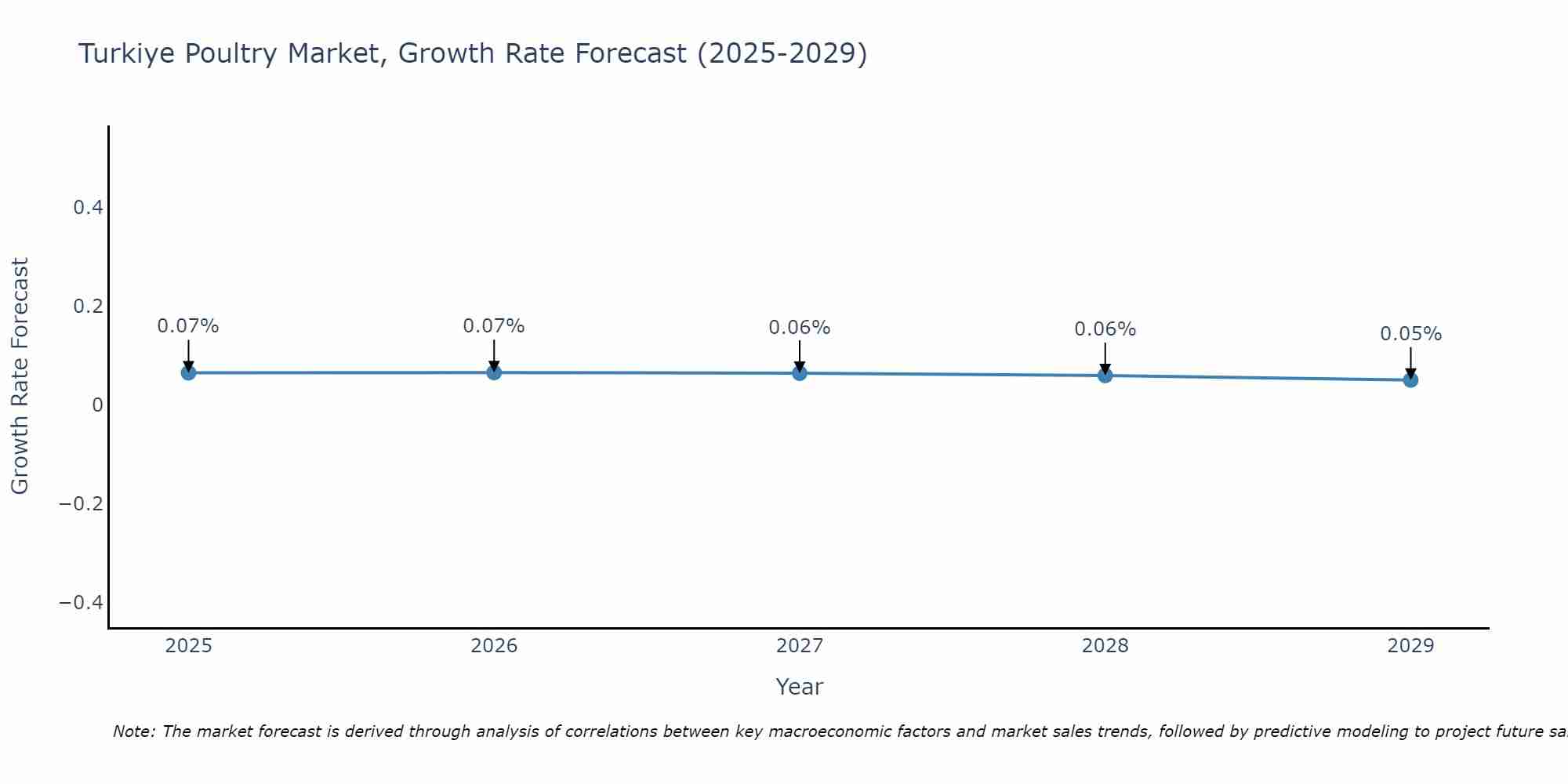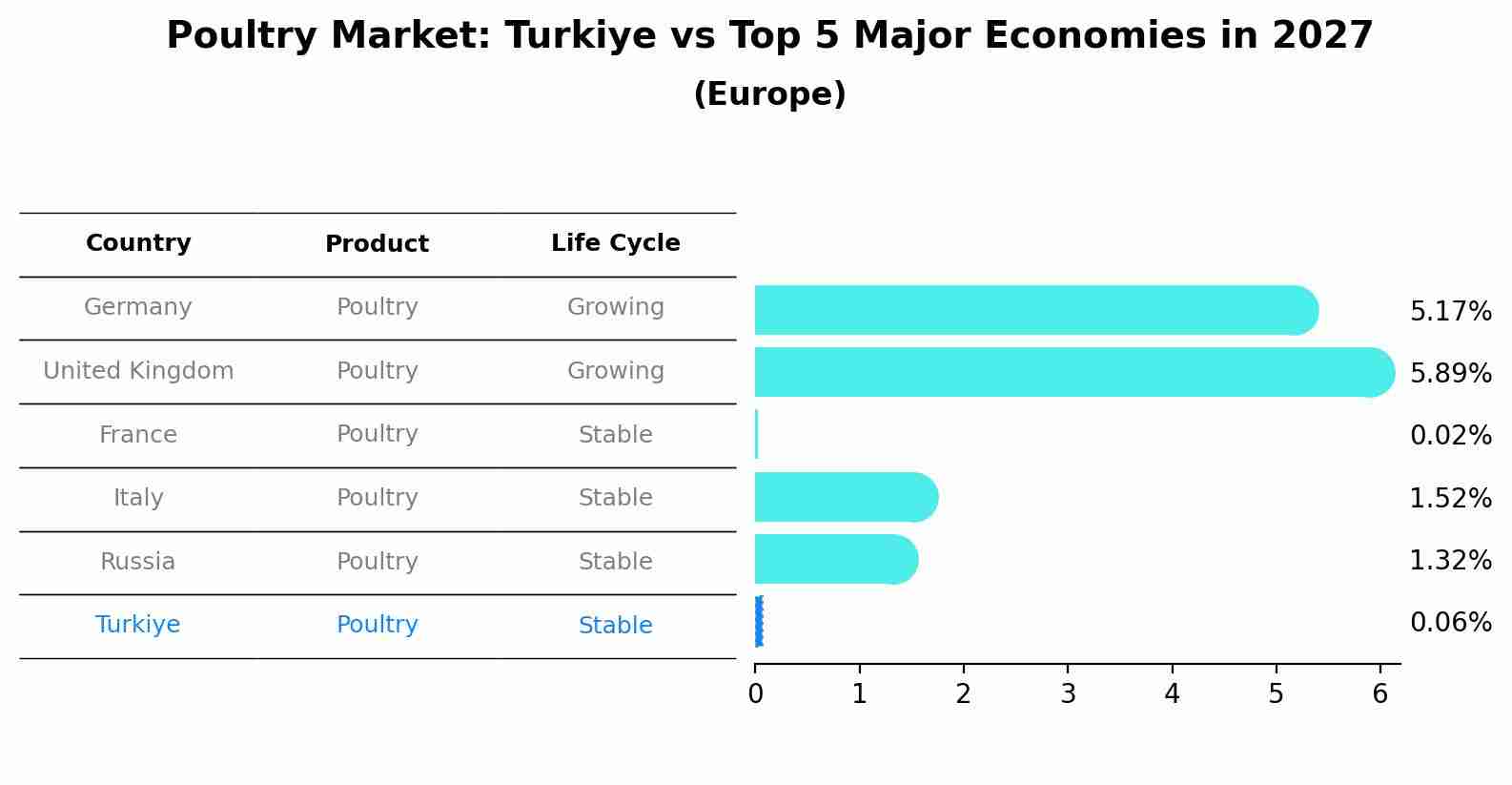Turkey Poultry Market Outlook | Value, Share, Trends, Forecast, Companies, Revenue, Size, Industry, Analysis, Growth & COVID-19 IMPACT
| Product Code: ETC384218 | Publication Date: Aug 2022 | Updated Date: Jul 2025 | Product Type: Market Research Report | |
| Publisher: 6Wresearch | Author: Shubham Padhi | No. of Pages: 75 | No. of Figures: 35 | No. of Tables: 20 |
Turkiye Poultry Market Size Growth Rate
The Turkiye Poultry Market is projected to witness mixed growth rate patterns during 2025 to 2029. Starting at 0.07% in 2025, the market peaks at 0.07% in 2026, and settles at 0.05% by 2029.

Poultry Market: Turkiye vs Top 5 Major Economies in 2027 (Europe)
The Poultry market in Turkiye is projected to grow at a stable growth rate of 0.06% by 2027, highlighting the country's increasing focus on advanced technologies within the Europe region, where Germany holds the dominant position, followed closely by United Kingdom, France, Italy and Russia, shaping overall regional demand.

Turkey Poultry Market Synopsis
The Turkey Poultry Market in Turkey is a significant sector within the country`s agriculture industry. Turkey is one of the leading producers and consumers of poultry products globally. The market is dominated by large-scale poultry farms that produce a variety of products including turkey meat, eggs, and processed poultry products. Consumer demand for poultry products remains strong due to the affordability and versatility of turkey meat. Key players in the market include companies such as Banvit, Keskinoglu, and Selpak. The market is also witnessing a growing trend towards organic and free-range turkey products as consumers become more conscious of food quality and animal welfare. Government regulations and initiatives to improve food safety standards and promote sustainable practices are shaping the future of the Turkey Poultry Market.
Turkey Poultry Market Trends
The Turkey Poultry Market is experiencing several key trends. Consumers are increasingly seeking healthier and more sustainable food options, leading to a rising demand for organic and free-range turkey products. There is also a growing interest in convenience products such as pre-marinated or pre-cooked turkey cuts to cater to busy lifestyles. Additionally, the rise of e-commerce and online grocery shopping platforms is influencing the way consumers purchase turkey products, with more people opting for online delivery services. In terms of sustainability, there is a greater emphasis on animal welfare practices and transparency in the supply chain, driving companies to adopt more ethical and environmentally friendly production methods. Overall, these trends are shaping the Turkey Poultry Market towards more premium, convenient, and sustainable offerings to meet evolving consumer preferences.
Turkey Poultry Market Challenges
In the Turkey Poultry Market, some key challenges include disease outbreaks like avian influenza which can significantly impact production and lead to trade restrictions. Fluctuating feed prices and currency exchange rates also pose challenges for poultry farmers in Turkey, affecting their profitability. Additionally, competition from imports and changing consumer preferences towards healthier or more sustainably produced poultry products are influencing market dynamics. Regulatory issues and compliance requirements, such as food safety standards and animal welfare regulations, further add complexity to the operating environment for poultry businesses in Turkey. Overall, navigating these challenges requires strategic planning, risk management, and a strong understanding of market trends to remain competitive in the Turkey Poultry Market.
Turkey Poultry Market Investment Opportunities
Investment opportunities in the Turkey Poultry Market in Turkey are promising due to the country`s strong domestic demand for poultry products, including turkey meat. With a growing population, increasing urbanization, and changing consumer preferences towards healthier protein sources, there is a significant market potential for turkey products in Turkey. Investing in turkey farming operations, processing facilities, and distribution networks could be lucrative in meeting the rising demand for turkey meat. Additionally, opportunities exist in value-added products such as processed turkey meat, ready-to-eat meals, and turkey-based snacks to cater to the evolving consumer preferences. As the Turkish government continues to support the poultry industry through subsidies and incentives, investing in the Turkey Poultry Market presents a viable opportunity for growth and profitability.
Jordan Agar Market Government Policies
Government policies related to the Turkey Poultry Market in Turkey include regulations on production standards, food safety, and animal welfare. The Turkish government has implemented measures to monitor and control the use of antibiotics in turkey production to ensure consumer safety and minimize the risk of antimicrobial resistance. Additionally, there are subsidies and support programs available to turkey farmers to promote growth and sustainability in the sector. Import regulations also play a role in shaping the market, with restrictions in place to protect domestic producers from unfair competition. Overall, the government`s policies aim to balance the needs of consumers, producers, and the environment while fostering a competitive and sustainable turkey poultry market in Turkey.
Turkey Poultry Market Future Outlook
The future outlook for the Turkey Poultry Market appears promising, driven by several factors. Increasing consumer awareness of the health benefits of turkey meat, such as being low in fat and rich in protein, is expected to drive demand. Additionally, the growing trend of seeking alternative protein sources and the rising popularity of turkey-based products like deli meats and sausages are likely to further boost market growth. Technological advancements in poultry farming practices, such as automation and improved breeding techniques, are enhancing productivity and efficiency in the industry. However, challenges such as fluctuating feed costs and potential disease outbreaks remain concerns that could impact market dynamics. Overall, the Turkey Poultry Market is anticipated to experience steady growth in the coming years, supported by evolving consumer preferences and industry innovations.
Key Highlights of the Report:
- Turkey Poultry Market Outlook
- Market Size of Turkey Poultry Market, 2021
- Forecast of Turkey Poultry Market, 2031
- Historical Data and Forecast of Turkey Poultry Revenues & Volume for the Period 2018 - 2031
- Turkey Poultry Market Trend Evolution
- Turkey Poultry Market Drivers and Challenges
- Turkey Poultry Price Trends
- Turkey Poultry Porter's Five Forces
- Turkey Poultry Industry Life Cycle
- Historical Data and Forecast of Turkey Poultry Market Revenues & Volume By Segments for the Period 2018 - 2031
- Historical Data and Forecast of Turkey Poultry Market Revenues & Volume By Broiler for the Period 2018 - 2031
- Historical Data and Forecast of Turkey Poultry Market Revenues & Volume By Eggs for the Period 2018 - 2031
- Historical Data and Forecast of Turkey Poultry Market Revenues & Volume By End Uses for the Period 2018 - 2031
- Historical Data and Forecast of Turkey Poultry Market Revenues & Volume By Food Service for the Period 2018 - 2031
- Historical Data and Forecast of Turkey Poultry Market Revenues & Volume By Household for the Period 2018 - 2031
- Historical Data and Forecast of Turkey Poultry Market Revenues & Volume By Distribution Channels for the Period 2018 - 2031
- Historical Data and Forecast of Turkey Poultry Market Revenues & Volume By Traditional Retail Stores for the Period 2018 - 2031
- Historical Data and Forecast of Turkey Poultry Market Revenues & Volume By Business To Business for the Period 2018 - 2031
- Historical Data and Forecast of Turkey Poultry Market Revenues & Volume By Modern Retail Stores for the Period 2018 - 2031
- Turkey Poultry Import Export Trade Statistics
- Market Opportunity Assessment By Segments
- Market Opportunity Assessment By End Uses
- Market Opportunity Assessment By Distribution Channels
- Turkey Poultry Top Companies Market Share
- Turkey Poultry Competitive Benchmarking By Technical and Operational Parameters
- Turkey Poultry Company Profiles
- Turkey Poultry Key Strategic Recommendations
Frequently Asked Questions About the Market Study (FAQs):
Export potential assessment - trade Analytics for 2030
Export potential enables firms to identify high-growth global markets with greater confidence by combining advanced trade intelligence with a structured quantitative methodology. The framework analyzes emerging demand trends and country-level import patterns while integrating macroeconomic and trade datasets such as GDP and population forecasts, bilateral import–export flows, tariff structures, elasticity differentials between developed and developing economies, geographic distance, and import demand projections. Using weighted trade values from 2020–2024 as the base period to project country-to-country export potential for 2030, these inputs are operationalized through calculated drivers such as gravity model parameters, tariff impact factors, and projected GDP per-capita growth. Through an analysis of hidden potentials, demand hotspots, and market conditions that are most favorable to success, this method enables firms to focus on target countries, maximize returns, and global expansion with data, backed by accuracy.
By factoring in the projected importer demand gap that is currently unmet and could be potential opportunity, it identifies the potential for the Exporter (Country) among 190 countries, against the general trade analysis, which identifies the biggest importer or exporter.
To discover high-growth global markets and optimize your business strategy:
Click Here- Single User License$ 1,995
- Department License$ 2,400
- Site License$ 3,120
- Global License$ 3,795
Search
Thought Leadership and Analyst Meet
Our Clients
Related Reports
- India Switchgear Market Outlook (2026 - 2032) | Size, Share, Trends, Growth, Revenue, Forecast, Analysis, Value, Outlook
- Pakistan Contraceptive Implants Market (2025-2031) | Demand, Growth, Size, Share, Industry, Pricing Analysis, Competitive, Strategic Insights, Strategy, Consumer Insights, Analysis, Investment Trends, Opportunities, Revenue, Segments, Value, Segmentation, Supply, Forecast, Restraints, Outlook, Competition, Drivers, Trends, Companies, Challenges
- Sri Lanka Packaging Market (2026-2032) | Outlook, Competition, Drivers, Trends, Demand, Pricing Analysis, Competitive, Strategic Insights, Companies, Challenges, Strategy, Consumer Insights, Analysis, Investment Trends, Opportunities, Growth, Size, Share, Industry, Revenue, Segments, Value, Segmentation, Supply, Forecast, Restraints
- India Kids Watches Market (2026-2032) | Strategy, Consumer Insights, Analysis, Investment Trends, Opportunities, Growth, Size, Share, Industry, Revenue, Segments, Value, Segmentation, Supply, Forecast, Restraints, Outlook, Competition, Drivers, Trends, Demand, Pricing Analysis, Competitive, Strategic Insights, Companies, Challenges
- Saudi Arabia Core Assurance Service Market (2025-2031) | Strategy, Consumer Insights, Analysis, Investment Trends, Opportunities, Growth, Size, Share, Industry, Revenue, Segments, Value, Segmentation, Supply, Forecast, Restraints, Outlook, Competition, Drivers, Trends, Demand, Pricing Analysis, Competitive, Strategic Insights, Companies, Challenges
- Romania Uninterruptible Power Supply (UPS) Market (2026-2032) | Industry, Analysis, Revenue, Size, Forecast, Outlook, Value, Trends, Share, Growth & Companies
- Saudi Arabia Car Window Tinting Film, Paint Protection Film (PPF), and Ceramic Coating Market (2025-2031) | Strategy, Consumer Insights, Analysis, Investment Trends, Opportunities, Growth, Size, Share, Industry, Revenue, Segments, Value, Segmentation, Supply, Forecast, Restraints, Outlook, Competition, Drivers, Trends, Demand, Pricing Analysis, Competitive, Strategic Insights, Companies, Challenges
- South Africa Stationery Market (2025-2031) | Share, Size, Industry, Value, Growth, Revenue, Analysis, Trends, Segmentation & Outlook
- Afghanistan Rocking Chairs And Adirondack Chairs Market (2026-2032) | Size & Revenue, Competitive Landscape, Share, Segmentation, Industry, Value, Outlook, Analysis, Trends, Growth, Forecast, Companies
- Afghanistan Apparel Market (2026-2032) | Growth, Outlook, Industry, Segmentation, Forecast, Size, Companies, Trends, Value, Share, Analysis & Revenue
Industry Events and Analyst Meet
Whitepaper
- Middle East & Africa Commercial Security Market Click here to view more.
- Middle East & Africa Fire Safety Systems & Equipment Market Click here to view more.
- GCC Drone Market Click here to view more.
- Middle East Lighting Fixture Market Click here to view more.
- GCC Physical & Perimeter Security Market Click here to view more.
6WResearch In News
- Doha a strategic location for EV manufacturing hub: IPA Qatar
- Demand for luxury TVs surging in the GCC, says Samsung
- Empowering Growth: The Thriving Journey of Bangladesh’s Cable Industry
- Demand for luxury TVs surging in the GCC, says Samsung
- Video call with a traditional healer? Once unthinkable, it’s now common in South Africa
- Intelligent Buildings To Smooth GCC’s Path To Net Zero


















